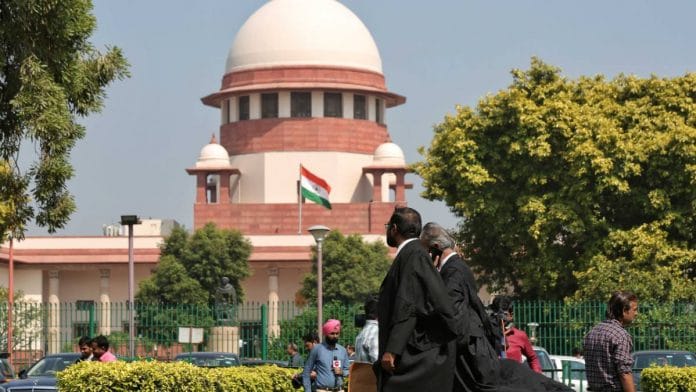New Delhi: Proof of demand and acceptance of bribes can be established through circumstantial evidence, the Supreme Court held Thursday.
In a verdict that is likely to tighten the noose around bribe takers, the top court said that when there is a lack of direct evidence — oral or documentary — it is permissible to draw an inferential “deduction of culpability”.
The ruling was delivered by a five-judge constitution bench led by Justice S A Nazeer. This bench was formed of reference when conflicting verdicts were delivered on the matter by two three-judge benches.
The moot question answered in the judgment is whether courts can draw inference from circumstantial evidence to convict someone under the Prevention of Corruption Act for demanding or accepting a bribe in case there is an absence of direct evidence, complaint or primary evidence of demand of illegal gratification.
Responding in the affirmative, the court, however, said that presumption of fact with regard to demand can be inferred only when the foundational facts of the case have been proven. The bench underlined certain points to be borne by a judge while deciding the case.
The court said, “In order to bring home the guilt of the accused, the prosecution has to first prove the demand of illegal gratification and the subsequent acceptance as a matter of fact. This fact in issue can be either proved by direct evidence, in nature of oral evidence or documentary evidence. Further, the fact in issue namely, the proof of acceptance of illegal gratification can also be proved by circumstantial evidence in the absence of direct, oral or documentary evidence.”
If the complainant dies, turns hostile or is unable to lead evidence during the trial, the demand can be proven by letting in the evidence of any other witness who can provide the same in oral or documentary form to prove the case. Such cases, the bench added, would not abate nor result in an order of acquittal.
It urged the prosecution to make sincere efforts to ensure that corrupted public servants are punished so that governance becomes “unpolluted and free from corruption”.
The bench quoted several previous judgments of the top court to stress how corruption amongst “public servants erodes public confidence in institutions, affects their functioning and also demoralises honest officials”.
“The efficiency in public service would improve only when the public servant devotes his sincere attention and does the duty diligently, truthfully, and honestly and devotes himself assiduously to the performance of the duties of his post,” the court held.
Also Read: Bihar IPS officer who inspired ‘Khakee’ booked for Netflix deal, says ‘did nothing wrong’
Lead up to the judgment
The reference to the five-judge bench arose after a three-judge bench in August 2019 noted that the law related to the issue was not settled.
It was in regard to the nature and quality of proof necessary to sustain a conviction for corruption offences under the Prevention of Corruption Act. Judgment was reserved in the matter on 22 November.
In 2015, the apex court in a case titled P. Satyanarayana Murthy vs the District Inspector of Police, state of Andhra Pradesh, held that in the absence of primary evidence, due to the death of the complainant, inferential deductions to sustain a conviction were impermissible in law.
The Murthy ruling was said to have taken a view divergent from that held in the Narsinga Rao case, declaring that inferential deductions are permissible.
Thereafter, several appeals under the Prevention of Corruption Act were adjourned following the reference made regarding the dispute.
(Edited by Theres Sudeep)
Also Read: Why Swati Maliwal is in the dock for ‘illegal appointments’ to Delhi’s women’s rights body






